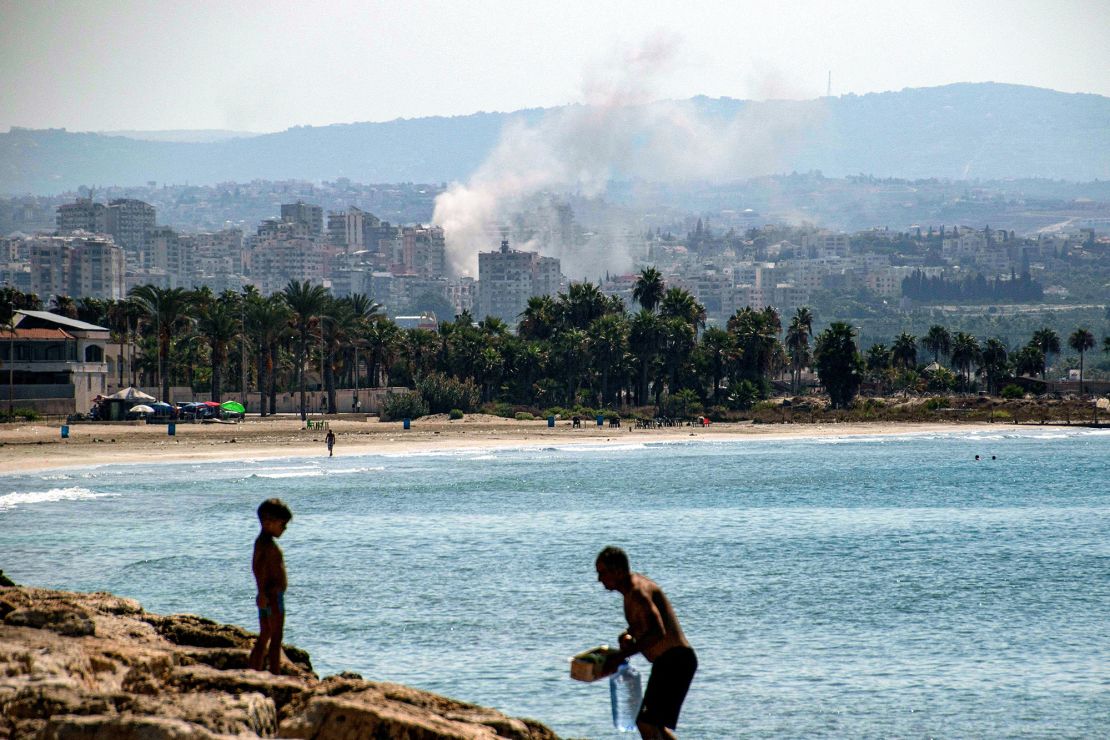
CNN
—
Israel intercepted a rocket fired by Hezbollah near Tel Aviv on Wednesday, an unprecedented attack by the militant group that reached deep into the country’s commercial districts and marked a new escalation in the conflict between the two sides.
Residents of Tel Aviv and the central city of Netanya woke up to sirens on Wednesday as Israel said its air defenses intercepted a surface-to-surface missile, the first time ever a Hezbollah rocket has reached so close to the city, the Israeli military said.
There were no immediate reports of damage or injuries.
The Iran-backed Hezbollah group confirmed it fired a Qadr-1 ballistic missile targeting the headquarters of Israel’s Mossad intelligence agency, which it accuses of being responsible for attacks targeting its members, including the coordinated explosions of thousands of pagers and walkie-talkies last week.
This is believed to be the first ballistic missile launched by Hezbollah towards Israel, and was launched “in support of our steadfast Palestinian people in Gaza” and “in defense of Lebanon and its people,” according to Hezbollah.
The Israeli military said the missile was intercepted near Tel Aviv, a city of more than four million people on the Mediterranean coast, and that the air force struck its launch pad in the Nafakhiya area of southern Lebanon.
The Israeli army said, “After sirens were heard in the Tel Aviv and Netanya areas, a surface-to-surface missile was detected launching from Lebanon, and was intercepted by the IDF’s air defense system.”
Israeli military spokesman Nadav Shoshani described the missile as “heavy” and “long-range.”
“This is the first time Hezbollah has fired towards Tel Aviv,” he said.
Hezbollah Secretary-General Hassan Nasrallah has repeatedly said that any Israeli strike on the Lebanese capital would prompt an attack on Israel’s economic hub.
The exchange of fire between Israel and Hezbollah continued on Wednesday.


The Israeli military said it struck more than 280 Hezbollah targets in Lebanon on Wednesday.
At least 51 people were killed in Lebanon on Wednesday, Health Minister Firass Abiad said, adding that “large waves” of people had been displaced across the country.
Meanwhile, about 40 rockets crossed into Israel from Lebanon on Wednesday morning, according to the Israel Defense Forces. Several were intercepted, but one hit an assisted living facility in northern Israel, with no injuries reported.
Since the conflict between Israel and the Palestinian Hamas movement erupted last October, Hezbollah has fired hundreds of rockets and drones from Lebanon targeting northern Israel.
Some 60,000 people have been evacuated from northern Israel as a result of the cross-border fighting. Israel has said the fighting will continue until it is safe for these residents to return to their homes.
The interception of the missile comes days after Israeli airstrikes targeting Hezbollah killed more than 500 people across Lebanon, including dozens of children. Monday was the deadliest day in Lebanon in nearly two decades.
Flights at Tel Aviv’s Ben Gurion Airport continued as normal on Wednesday, an airport spokesman said.
Sirens were heard in the city of Netanya on Wednesday for the first time since October 7, 2023, according to Israeli authorities.
In recent days, Israel and Hezbollah have exchanged waves of airstrikes and rocket attacks, forcing thousands of people to flee their homes in southern Lebanon.
Israel said it was targeting Hezbollah positions and infrastructure – which it said were located in residential areas – with one strike killing senior commander Ibrahim Qubaisi on Tuesday. The Israeli military said Qubaisi commanded various Hezbollah missile units and was killed along with two other commanders in southern Beirut.
Residents who fled their homes in Lebanon said residential areas were flattened and entire cities were emptied of their residents. One man told CNN he saw “constant shelling from every direction” and described it as “random shelling.”

The United Nations Children’s Fund (UNICEF) has warned that many children are still “missing under the rubble” and stuck “on dangerous roads” after Israeli airstrikes.
At least 558 people were killed in Israeli air strikes on Monday, including 50 children and 94 women, Lebanon’s health minister, Firass Abiad, said. Ettie Higgins, UNICEF’s deputy representative in Lebanon, told a U.N. news briefing that more children were killed in the country in a single day on Monday than in the whole of last year.
Meanwhile, Lebanese hospitals are struggling to cope with the influx of wounded, with those in need of treatment having difficulty getting to hospital, as roads are jammed with people trying to flee Israeli strikes. British-Palestinian doctor Ghassan Abu Sitta said the healthcare system was “very fragile” and could not cope with more than 2,000 casualties in two days.
“We received children with unfortunately the same type of injuries that you are used to seeing in Gaza,” Abu Sitta told CNN. “Blast injuries to the face, amputations, multiple shrapnel injuries, crushing injuries from houses collapsing on top of them.”
Lebanese Foreign Minister Gebran Bassil said on Tuesday that estimates indicate that half a million people have been displaced in Lebanon, with expectations that this number will rise.
Umm Hussein’s family was among the thousands who fled the south of the country. They spent 14 hours on the road to Beirut, stuck on busy roads, and said they had no time to collect clothes or medicine. “We had no food or water, but volunteers on motorbikes were distributing water to those stuck in cars,” she told CNN.
The Israeli army warned the displaced from southern Lebanon on Wednesday not to return to their homes, and vowed to accelerate its “offensive operations” against Hezbollah without mercy.
Israeli forces conducted maneuvers simulating ground combat in Lebanon, which the army did not rule out.
This is a developing story and will be updated.

“Travel specialist. Typical social media scholar. Friend of animals everywhere. Freelance zombie ninja. Twitter buff.”





More Stories
Taiwan is preparing to face strong Typhoon Kung-ri
Israel orders residents of Baalbek, eastern Lebanon, to evacuate
Zelensky: North Korean forces are pushing the war with Russia “beyond the borders”